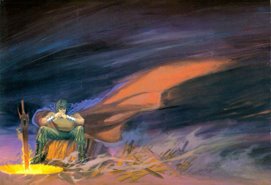Giving Reason For The Hope III
The Possibility And Necessity of Apologetics In Church History
Historically speaking, the apologetic task had an important pedigree and we could learn from its ancient role in the church’s mission as the gospel spread to a predominantly Gentile context. By the second century, educated converts like Justin Martyr, Theophilus of Antioch, Athenagoras and Aristides of Athens wrote substantial apologetic literature in the face of persecution and intellectual challenges from their Greco-Roman civilisation.![]() They do not just argue about religion but broader cultural issues like religious freedom, the meaning of education and history of nations. Justin showed appreciation for Socrates and Heraclitus as men who partook of a vague knowledge of the Logos, as honorary Christians specifically in their rejection of pagan religious practices and subsequent ostracization. While we do not know if they had much success with the pagan intelligentsia or political rulers to whom the corpus was addressed, the Apologists nonetheless provided a theological foundation on which later Christian thinkers would develop and finally replace the prevailing pagan philosophies of the day.
They do not just argue about religion but broader cultural issues like religious freedom, the meaning of education and history of nations. Justin showed appreciation for Socrates and Heraclitus as men who partook of a vague knowledge of the Logos, as honorary Christians specifically in their rejection of pagan religious practices and subsequent ostracization. While we do not know if they had much success with the pagan intelligentsia or political rulers to whom the corpus was addressed, the Apologists nonetheless provided a theological foundation on which later Christian thinkers would develop and finally replace the prevailing pagan philosophies of the day.  Although the legacy of other apologists operating in the context of mission encounter could be cited, their role has significantly diminished in the modern era. In order to glean some lessons on how apologetics at its best has served the church, I would just highlight two outstanding theologians even though their contribution was not entirely without fault . Burdened by many ecclesiastical and pastoral concerns, Augustine was a North African bishop during the fifth century A.D. while Aquinas was a widely-travelled Dominican monk in the medieval era. The former wrote his most significant treatise, The City of God, in response to an “epochal shift” occassioned by the fall of Rome while the latter was roused to encounter the rise of a sophisticated Islamic civilisation in Spain with Summa Contra Gentiles.
Although the legacy of other apologists operating in the context of mission encounter could be cited, their role has significantly diminished in the modern era. In order to glean some lessons on how apologetics at its best has served the church, I would just highlight two outstanding theologians even though their contribution was not entirely without fault . Burdened by many ecclesiastical and pastoral concerns, Augustine was a North African bishop during the fifth century A.D. while Aquinas was a widely-travelled Dominican monk in the medieval era. The former wrote his most significant treatise, The City of God, in response to an “epochal shift” occassioned by the fall of Rome while the latter was roused to encounter the rise of a sophisticated Islamic civilisation in Spain with Summa Contra Gentiles.  In a perceptive study by Curtis Chang, we could see that in their differing interaction with neo-Platonism and Aristotelian philosophy respectively, both men employed a similar rhetorical strategy to enter the challenger’s story, retell it and capture the retold story within the gospel narrative. That is, both men immersed themselves within the paradigm, authorities or story of the alternative worldview to find a shared space for dialogue, then reinterpret it to reveal tragic incompleteness or dissonant tensions inherent in its plot and finally capturing the rival stories by revealing how the ‘resolution’ is finally found in the gospel. They were not trapped behind an airtight fortress that has no point of contact with others. Neither did they lose the dramatic plot of an overarching Christian narrative.
In a perceptive study by Curtis Chang, we could see that in their differing interaction with neo-Platonism and Aristotelian philosophy respectively, both men employed a similar rhetorical strategy to enter the challenger’s story, retell it and capture the retold story within the gospel narrative. That is, both men immersed themselves within the paradigm, authorities or story of the alternative worldview to find a shared space for dialogue, then reinterpret it to reveal tragic incompleteness or dissonant tensions inherent in its plot and finally capturing the rival stories by revealing how the ‘resolution’ is finally found in the gospel. They were not trapped behind an airtight fortress that has no point of contact with others. Neither did they lose the dramatic plot of an overarching Christian narrative.
As testament of their labor, Augustine defeated the pagans’ attempt to blame Christianity for Rome’s decline, insisted that the city of God is never coterminous with any “Christian nation” and made possible the preservation of learning in medieval churches. Without Aquinas, the church may reject wholesale Aristotelian insights on sensory-based experiment and empirical evidences, thereby crippling the emergence of modern science in the West. Their legacy of cultural relevance and biblical faithfulness should spur present day Christian thinkers to greater exploits.







No comments:
Post a Comment